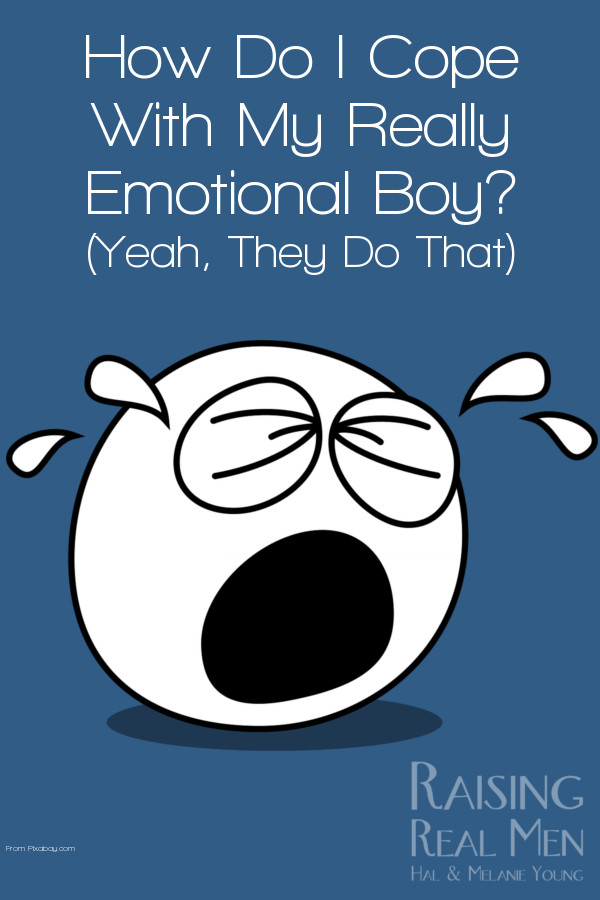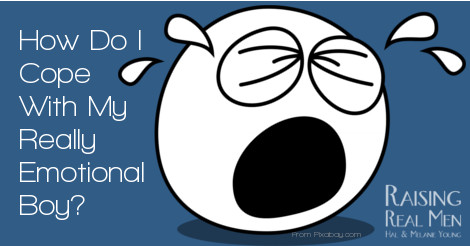Q&A: How Do I Cope With My Really Emotional Boy?
“My son, who is 9, seems so sad all the time, keeps to himself, cries a lot, even when we try to do stuff he likes or stuff he asks. He can’t seem to think of anything to do by himself, but gets upset when his brother bosses him around. So, he’s bored, I’m at a loss with him.”
Emotions are complex things to deal with – they are both matters of the spirit and things with a physical component, too. Our feelings are related to different chemicals in the brain and body, and the balance of those chemicals can change for many different reasons. We might be alarmed or startled by some external event and feel a rush of adrenaline that makes us feel agitated, alert, and irritable. We might be feeling the same things from too much coffee! Or we might feel blue and depressed because of the death of a friend or the loss of a job, seriously sad events, but then some people feel that way from a lack of sunlight or a dietary deficiency.
That means sometimes we can’t point to a reason for a feeling, even though we feel it very strongly anyway.
When you said “9-year-old,” that immediately brings up something we’ve seen over and over again: the hormonal roller coaster of puberty. Nobody told us that boys get “hormonal” but after six of them we know, they really, really do. One minute they’re angry at the world and ready to fight it all, and twenty minutes later they’re weepy and sad.
In the earliest days of adolescence, long before you see outward signs of development (voice cracking, the start of facial hair, and a growth spurt, for instance), the hormones which cause those changes start to flow. The challenge is that they don’t seem to start gradually and ramp up smoothly — they seem to come in spurts and pulses, and that causes all kinds of mood swings. We joke about this as the boys’ PMS – Pre-Manhood Syndrome – that lasts about two years instead of a week.
The best thing for this sort of emotion is for you, the parent, to remain very calm. Think of your son as a sailor in a rowboat, tossed by rough waves; he needs a rock to anchor on, but sometimes the waves are crashing him against the rock and he thinks the rock is the problem. We find with our guys that when they go into an emotional churn, if we take a breath and keep our peace, their emo storm tends to run itself out. We can be a point of stability when their lives seem very confusing and upside down.
Boys seem to run toward anger and aggression during this time, but swing back toward sadness and dejection between the peaks. Some swing harder to the anger side, others swing harder toward the depression, but it’s important to remember than every emotion doesn’t have an immediate cause other than the chemistry boiling inside.
Sometimes you can help the chemistry without resorting to medication. We find a tendency to depression in our own family, and we all feel better when we get enough omega-3 fats in our diet. The easy way for us is just to take fish oil capsules once a day. We seem to concentrate better, too.
You might also look at a little extra vitamin D, or extra time out in the sun (without a heavy coating of sunscreen!) — a shortage of D lowers your immune system and it can affect your moods.
Oddly enough, research shows that gut health impacts your emotions, sometimes in powerful ways. Adding a good probiotic can make a very real difference for some people.
Encourage some perspective. It might be helpful to talk through situations and fears he may have. Emotions can overwhelm our logical thoughts, and if someone we trust can come along side and help us think again, the feelings may settle down. This last week I took our girls out on the beach at night; the youngest, a six-year-old, was very uneasy about walking in the unfamiliar darkness, but I held her hand, let her be a little clingy, and kept talking about how safe she was with Daddy, and how beautiful the stars and the waves were. After a while, she began to notice things on her own, and she was much happier at the end than she was at the beginning!
Help him understand that there may be a better way to behave than breaking down. Boys who cry easily often get bullied, which only makes them feel more sadness. It’s said that courage means doing the right thing even when you feel fear. If you feel sad but you try to “be brave,” sometimes it helps drive away the blue feelings — and it may prevent unkind people from treating you badly.
And even if there’s reason to feel sad, there are different ways to express it. Every parent knows the difference between a baby’s cries – there’s a difference between “I’m crying because I’m hurt and can’t help myself,” and “I’m crying because I’m MAD and want your attention!” If it’s attention he needs, show him better ways to ask for it.
Don’t automatically rule out something causing his feelings. Even dramatic kids who seem to be emotional all the time, occasionally have a good reason to be upset. Ask him to describe if something is worrying him, or if someone is treating him badly, or if he’s sick or hurt in some way. Those things are appropriate reasons to cry! Remember that the Lord Jesus wept when His friend Lazarus died, even though He knew He would shortly raise him from the dead. It’s not wrong to cry!
The feelings are real even if he doesn’t know why he feels them. You can show sympathy because he really does feel sad, while asking questions to see whether there’s something wrong – or to encourage him to see there’s nobody making him feel that way. The good news is that lacking some ongoing cause – persistent bullying, a clinical level of depression, or some medical imbalance – you can expect your 9-year-old will get through this stage and seem like a very different young man soon.
In Christ
Hal and Melanie
Do you have real feelings of being the center of a whirlwind of emotional boyhood? Are you grappling with his rage and regret, back and forth? And by the way, his schoolwork is suddenly problematic, and he’s suddenly asking questions that are very uncomfortable to discuss? Then you need to check out Boot Camp 9-12, our intensive online program to help parents of pre-teen sons understand their rapidly-changing boys – and become more confident, effective parents for them! CLICK HERE to read more!
Even if we haven’t scheduled the next live sessions, you can get the pre-recorded version NOW.
Also be sure to check out our award-winning book, No Longer Little: Parenting Tweens with Grace and Hope. Parents tell us it is a life-saver for these years!
 We talk about this at more length on episode 101 of our podcast,
We talk about this at more length on episode 101 of our podcast,
Making Biblical Family Life Practical
on the Ultimate Homeschool Radio Network


